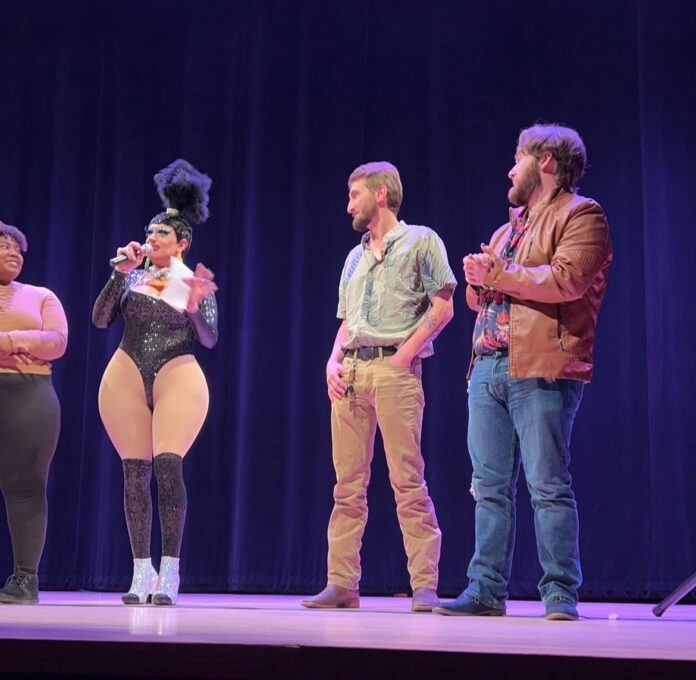I want to preface this by saying that I’m not a fan of drag. I have only a passing knowledge of the subculture’s existence, I don’t think I’ve ever watched “Rupaul’s Drag Race” but I know people who are deeply invested in it. I had to look into what a drag performance even was because I sincerely didn’t know what it consisted of. Do they sing? Do they dance? Some sort of vaudeville comedy routine? Turns out it’s a mix of all three.
So none of this comes from the mouth of a staunch defender, but an outsider looking in. It’s not a world that I have any much knowledge in or awareness of.
Which is why I find myself deeply, deeply confused at the fact that drag — as a practice and an art form — has recently become politically significant. As it stands right now, the seeds of an anti-drag legislative regime are being planted in several states, and it’s become folded into the broader conversation about LGBTQ+ rights and expression. This debate, it’s generous to call it that, has become so heated that there have been several recorded instances of armed protest groups attempting to disrupt drag performances.
I can’t help but feel a bit blindsided by this — like a new political discourse jumped out of the bushes to startle me. I suspect that I may not be alone in my confusion, so I figured a brief inquiry into all of this would be useful.
The specific, core complaint of the anti-drag crowd is that drag is a sexual act that is inappropriate for children, with performances representing an opportunity for drag queens to groom them.
There are two definitions of grooming in this context: the most severe of which is its actual one. Rape, Abuse, and Incest National Network (RAINN), a U.S. based anti-sexual violence organization, defines grooming as “manipulative behaviors” used by sexual abusers “to gain access to a potential victim, coerce them to agree to the abuse, and reduce the risk of being caught.” A common example of this would be an adult befriending a teenager for the purpose of engaging in illicit activity with them when they reach legal age.
This is a sex crime, it has a specific legal and cultural definition. To accuse someone of this is to accuse them of a specific act, and after a fair bit of research, I can find zero instances of a drag queen committing this crime in recent memory (or in the more distant past, for that matter.) There was one fairly high-profile instance in 2021 of a drag queen being arrested for possession of child pornography, which is in the same ballpark as what we’re talking about. So to say that nothing like this has ever happened would be factually dishonest, but there’s nothing indicative of any sort of trend or systemic issue. What that drag queen did was a personal choice, it does not reflect the group as a whole.
The second interpretation of “grooming” seems to be what people really mean when they say it. I don’t think any commentators have been foolish enough to say it outright, but the very obvious implication is that things like “Drag Queen Story Hours” in schools are meant to “groom” your children into being a part of the LGBTQ+ community, to indoctrinate them into following that lifestyle. There are two things I would say to someone who believes this:
Is that how you think it works? I don’t mean to condescend, but people do understand that you can’t be turned gay, right? It’s common knowledge that it’s not a choice or something you can be persuaded into. Even if 8-year-old Timmy comes home from school and says “mommy, the drag queen read to us and I like boys now,” it wouldn’t carry any weight unless he actually liked boys. In fact, from what I can gather, the only relevant predictor of homosexuality is whether or not someone is attracted to the same sex.
Second, even if I hypothetically concede that this is the goal — either intentionally or unintentionally — what’s wrong with being gay? Remember, this is perceived as a harmful outcome, one that needs to be legislated against. Specific actions are being criminalized in order to prevent it. If this was how it worked, if it was possible to be tricked into it, why would that be something to fear? If 8-year-old Timmy actually meant what he said, why would that be a problem?
What’s most aggravating about all of this journalistically is that the whole panic stems from a random assortment of videos circulating on social media, unrelated anecdotes often devoid of context.
Now, to be fair, some of these videos aren’t great. A few in particular depict kids giving money to drag queens in an act that’s clearly meant to mimic the way other types of explicit performers are compensated. And, alright, this isn’t hurting anyone – it’s clearly a joke – there’s plenty of adult supervision and it’s not evidence of anything serious. But maybe it’s not really necessary, maybe it’s a bit much.
Another one shows a girl being given a lap dance during a drag show at a community college. Okay, that’s a little unbecoming.
Are these significant social ills? Do these things require political mobilization to solve? No. But hey, drag queens, maybe tone it down a bit! Just a little! Dial it back, like, 10%. At least until you’re not being witch-hunted. That is not to say what you’re doing is wrong, your profession and shows elicit great courage and pride of oneself – but be mindful of your audience.
For comments/questions about this story, email the.whit.rowan@gmail.com or tweet @TheWhitOnline






